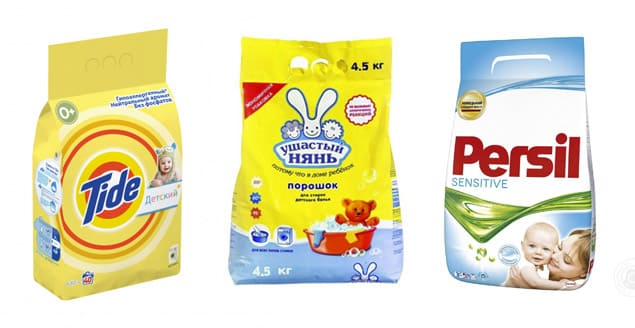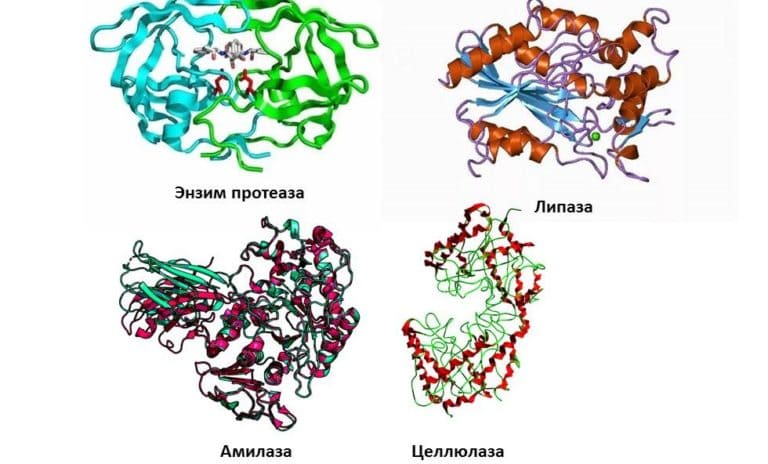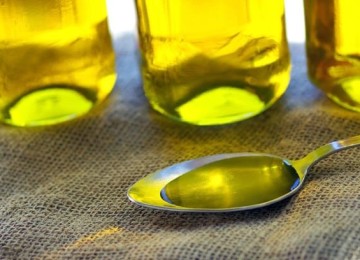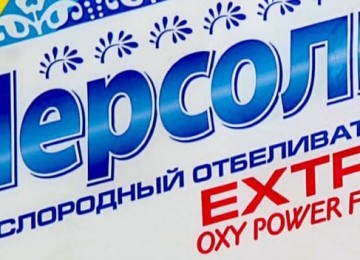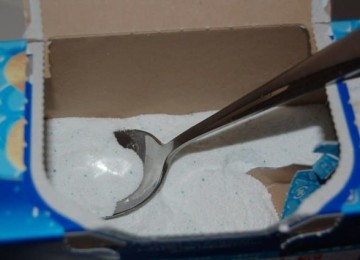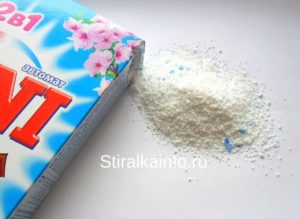 Have you ever heard of enzymes in washing powders? No and don’t know what it is? They are chemical compounds of protein origin that break down contaminant molecules. These substances are 100% safe for humans and the environment, but at the same time they can destroy fabric.
Have you ever heard of enzymes in washing powders? No and don’t know what it is? They are chemical compounds of protein origin that break down contaminant molecules. These substances are 100% safe for humans and the environment, but at the same time they can destroy fabric.
Types of enzymes that are added to washing powders
The chemical compounds we are considering include more than twenty amino acids, thanks to which experts create products for certain types of stains. Technologists combine types of enzymes to increase the effectiveness of washing powders.
Types of enzymes that are added to washing powders:
- Proteases;
- Lipases;
- Amylase;
- Cellulases;
- Keratinases.
Let's talk about each of them and what functions enzymes perform.
Proteases
Proteases are alkali, so they cope with protein-type contaminants, i.e. with grass and blood stains.
They bind to protein and are then transformed into peptides that are easily soluble in water. Thus, proteases are easily washed out of clothing.
Lipases
Lipases are designed to combat fatty and oil-type contaminants, i.e. with stains from sweat and food.These contaminants are present on almost all wardrobe items, so when choosing composition for washing be sure to pay attention to the volume of lipases: the more, the better.
Amylase
Amylases do an excellent job of removing starch stains - from potatoes, pasta, cereals, etc.
They break down starch into two components: simple sugars and dextrins. And in the end, everything is diluted together with a cleaning solution.
Cellulases
Cellulases take care of the material. Over time, “pellets”—protruding microfibers—appear on the surface of clothes for everyday wear (blouses, sweaters, etc.). Cellulases remove them, leaving your favorite items as good as new. They are unique in that they act efficiently and at the same time accurately.
Keratinases
Keratinases are specific - they only wash away dead skin cells and have no other functions. They work even in the most difficult situations.
Features of washing powders with enzymes
The enzymes themselves are available in the form of granules or liquid. They can be either single-component (only proteases, lipases, amylases, cellulases or keratinases) or multi-component (for example, proteases + lipases). Depending on the composition, they are painted in different colors.
As stated earlier, enzymes are 100% natural and therefore non-toxic. Unfortunately, this is only relevant if the company complies with product production technology and internal regulations. Some washing powders still dangerous. It is best to avoid little-known remedies.
The formulation of laundry detergent with enzymes is affected by:
- the direction of the means, i.e. what type of pollution will it act on;
- working temperature;
- acid-base balance;
- ionic strength;
- a type of surfactant (surfactant);
- presence or absence of oxidizing agents, etc.
It turns out that it is impossible to develop a laundry detergent with enzymes that would deal with all stains. Technologists are forced to choose one or two areas of the product. Enzymes do not combine well with bleaches, and are sometimes completely destroyed by them.
Rules for using washing powders with enzymes
Secondly, if you need to tidy up a very dirty product, then soak it first and only then wash it. This way you will get rid of all contaminants.
The best washing powders with enzymes
We will list only the most popular washing powders with enzymes. Of course, there are other worthy means.
Villi
This washing powder is created specifically for clothes made of delicate fabrics (silk, wool, etc.). It cleans it without damaging the structure. It also returns the original softness.
Dalli Activ Plus
This washing powder is suitable for those who often encounter protein-type stains. According to customer reviews, it does not help against oil stains. In other words, it can only be used against grass and blood marks.
Binatec
This washing powder is indispensable for families with children. It removes almost all types of stains, and works even in cold water. In addition, this product is gentle on all fabrics - both artificial and natural.
Are enzymes harmless?
If we talk about harm to health, then the answer is yes, they are harmless.
And if we talk about harm to clothes, then the answer is depending on the quantity. If these enzymes are present in normal amounts, they are beneficial, but if there are too many of them, they have a negative effect on fibers. Enzymes are especially dangerous for natural fabrics (silk, wool, etc.). As a rule, there is a warning about this on the back of the washing powder package.
Let's summarize. Modern washing powders with enzymes is much better than traditional products. And all because, when used correctly, they are no less effective and do not destroy the fabric. It is also important that these products are not harmful to humans and the environment - they do not cause allergies or diseases of the respiratory system.
We hope that our article was clear and helped to understand the features of enzymes.
